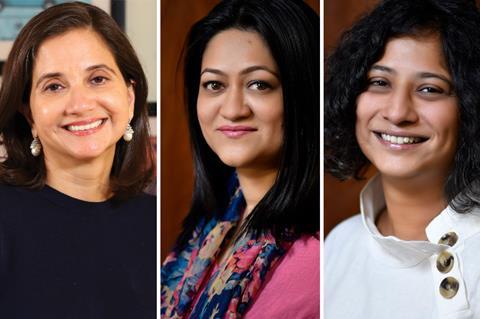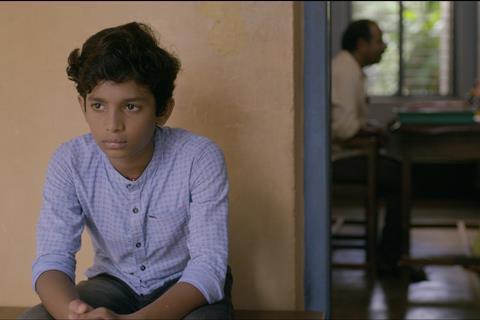
The Jio MAMI Mumbai Film Festival has returned for its first in-person edition since 2019 with a fresh focus on South Asian filmmaking and a brand new festival centre. But even those at the top had a moment of doubt.
“There was a point when I didn’t know if we’d make it,” says Anupama Chopra, festival director at the Mumbai Academy of Moving Image (MAMI), the public trust that organises the festival.
“The last three years have been very difficult for everybody in the festival ecosystem so we are not at all unique in what happened to us. But I had those conversations in my head of whether it was time to just let go. Had [the festival] run its course?”
After three years impacted by the pandemic, she puts the return of the festival down to the hard work of the MAMI board and actor/producer Priyanka Chopra Jonas, who was appointed chairperson of the event in 2021.
“Thankfully, we persisted and Priyanka Chopra, who is the most dynamic leader one can have, just inspired the hell out of us and we just kept going,” adds Chopra, herself a respected author and journalist who has been at MAMI for nine years.
The festival will run for 10 days from October 27 to November 5, showing more than 250 features and shorts across 20 screens in eight venues across Mumbai, opening with Hansal Mehta’s The Buckingham Murders, a gritty crime drama set in the UK and starring Kareena Kapoor Khan. Some 130 filmmakers will present their films in person.
One of the key factors in the levelling up of the festival is its new hub, the Nita Mukesh Ambani Cultural Centre (NMACC), which opened at the end of March and includes a 2,000-seat theatre that is reportedly the “most technologically advanced in India”.
The festival’s artistic director, Deepti Dcunha, says the importance of the new venue to its future ambitions cannot be understated.
“We faced a conundrum,” she recalls. “In 2019, we were already a very big festival and had reached the maximum number of screens. Coming back, we didn’t want to return as a smaller festival… so how could we get bigger?
“We were extremely lucky because during this time, our title sponsor Jio built the most prestigious venue in the city, the NMACC, which includes this 2,000-seat theatre and we’re very excited because the demand is there from audiences to fill it.”
South Asia focus
The three-year break also gave the organisers an opportunity to reshape the focus of the festival, dropping its international and India Gold competitions in favour of its first South Asia competitive section and beginning its push to become a hub for cinema and talent from the region and diaspora.
The 14 films in the South Asia Competition are from first and second-time filmmakers from India, Bangladesh, Bhutan and Nepal as well as diaspora filmmakers from the UK and Germany, and aims to showcase rising talent. They will compete for the Golden Gateway and Silver Gateway awards, previously awarded in the international competition.

Four world premieres in the competition include Leesa Gazi’s A House Named Shahana; Dibakar Das Roy’s Dilli Dark; Sumanth Bhat’s Mithya; and Fazil Razak’s The Sentence. They sit alongside titles that have already scored international attention such as Jaishankar Aryar’s Busan winner Shivamma; Pawo Choyning Dorji’s Oscar-submitted The Monk And The Gun; and Fidel Devkota’s The Red Suitcase, which premiered at Venice.
“We have broadened our vision to becoming a South Asian festival for multiple reasons,” explains festival co-director Maitreyee Dasgupta. “A lot of neighbouring countries are making films that are being recognised globally but most of the business conversations eventually end up coming to Mumbai as it is the financial hub of the region where all the corporations are based.
“So it only seemed logical to bring everyone here, where connections can be built and people can explore distribution, syndication deals and conversations with other film festivals and sales agents throughout the region. We’ve got all the ingredients together so are now hoping they get together and make a fabulous soup.”
“Basically, we’re trying to arrange marriages,” adds Chopra, with a laugh.
“Asia is a huge continent with great filmmaking but when European festivals pick up titles, they usually go for Chinese, Southeast Asia, Japan or Korea and the numbers are a lot smaller when you look at the South Asian inclusion,” says Dcunha. “We really want to make a statement that we are making films that the world should be looking at and this feels like the right time to do so.”
New and returning sections
This new focus will also be extended to non-competitive section Focus South Asia, which includes 22 features such as All India Rank by Varun Grover, which closed International Film Festival Rotterdam, and Karan Tejpal’s Stolen, which premiered at Venice.
Also introduced this year is Icons South Asia, featuring standout films by talent from the region and includes Vasudhaiva Kutumbakam by Anand Patwardhan, Indi(r)a’s Emergency by Vikramaditya Motwane, Paradise by Prasanna Vithanage and Something Like An Autobiography by Mostofa Sarwar Farooki.
The Gala Premier South Asia strand will comprise some of the most ambitious Indian films of the year such as Kennedy by Anurag Kashyap, Sharmajee ki Beti by Tahira Kashyap and Everybody Loves Sohrab Handa by Rajat Kapoor.
Returning sections include Marathi Talkies, in which Jio MAMI spotlights contemporary voices from its home region (Maharashtra), and shorts strand Dimensions Mumbai.
Films from outside the region will continue to have a platform at the festival, with the World Cinema strand including 99 titles from more than 35 countries such as Cannes’ Palme d’Or winner Anatomy Of A Fall by Justine Triet, Monster by Hirokazu Kore-eda, Strange Way Of Life by Pedro Almodóvar, The Old Oak by Ken Loach and Maestro by Bradley Cooper.
The will also be a Recap strand, revisiting titles selected by the festival in 2021 and 2022, which took place online. The filmmakers have been invited to attend and take part in a post-screening Q&As.
After three years away, Chopra says that bringing the festival back in-person is “very emotional”.
“Right now, we’re at that stage where you wonder why you thought this was a good idea, if you’re ever going to do it again and somehow surviving the next 10 days” she adds. “It is a festival that has had its ups and downs. In 2014, I got involved because the festival was shutting down and I couldn’t bear the idea of this incredible festival just shutting shop.
“At that point, we reached out to people. We did not have Jio as a sponsor. It was literally a crowdfunded festival that happened because people loved it so much, writing big cheques and small cheques to ensure it surirved long enough for us to get sponsors on board. I feel a little bit of that same feeling again, where the festival almost died, and then Phoenix-like came back to life.
“But there is this mad passion for the movies, which I think is an Indian disease. I go to a lot of festivals but Mumbai has this kind of slightly crazy edge that I’m not sure anybody else does.”






![The Brightest SunScreen[Courtesy HKIFF]](https://d1nslcd7m2225b.cloudfront.net/Pictures/274x183/3/5/0/1448350_thebrightestsunscreencourtesyhkiff_312678.jpg)


















No comments yet